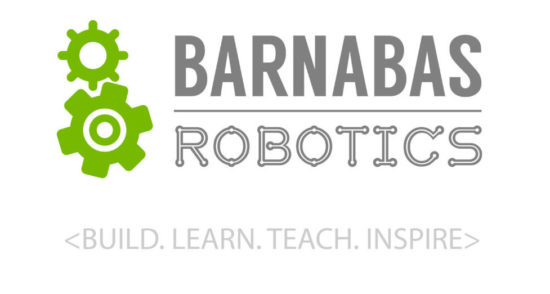
Lesson Plan
Lesson Overview
Here is some additional sample code for reference.
Dial Mode
Program your robot arm in dial mode so that you can control all 4 axes using the dial.
Sample Code
#include <Servo.h>
#define CLAWMOTOR_MAX 90
#define CLAWMOTOR_MIN 65
#define CLAWMOTOR_MID (CLAWMOTOR_MAX + CLAWMOTOR_MIN)/2
#define TILTMOTOR_MAX 155
#define TILTMOTOR_MIN 80
#define TILTMOTOR_MID (TILTMOTOR_MAX + TILTMOTOR_MIN)/2
#define EXTENDMOTOR_MAX 105
#define EXTENDMOTOR_MIN 10
#define EXTENDMOTOR_MID (EXTENDMOTOR_MAX + EXTENDMOTOR_MIN)/2
#define PANMOTOR_MAX 180
#define PANMOTOR_MIN 0
#define PANMOTOR_MID (PANMOTOR_MAX + PANMOTOR_MIN)/2
Servo panMotor;
Servo tiltMotor;
Servo extendMotor;
Servo clawMotor;
int potPin1 = 0;
int potPin2 = 1;
int potPin3 = 2;
int potPin4 = 3;
int panMotorPin = 6;
int tiltMotorPin = 9;
int extendMotorPin = 10;
int clawMotorPin = 11;
void setup() {
// put your setup code here, to run once:
panMotor.attach(panMotorPin);
tiltMotor.attach(tiltMotorPin);
extendMotor.attach(extendMotorPin);
clawMotor.attach(clawMotorPin);
Serial.begin(9600);
}
void printPotStatus() {
Serial.print("Pot1 = " + String(analogRead(potPin1)));
Serial.print(" Pot2 = " + String(analogRead(potPin2)));
Serial.print(" Pot3 = " + String(analogRead(potPin3)));
Serial.println(" Pot4 = " + String(analogRead(potPin4)));
}
void processPot() {
int panMotorAngle = map(analogRead(potPin1),0,1023,0,180);
panMotor.write(panMotorAngle);
int tiltMotorAngle = map(analogRead(potPin2),0,1023,0,180);
tiltMotor.write(tiltMotorAngle);
int extendMotorAngle = map(analogRead(potPin3),0,1023,0,180);
extendMotor.write(extendMotorAngle);
int clawMotorAngle = map(analogRead(potPin4),0,1023,0,180);
clawMotor.write(clawMotorAngle);
//Serial.println(panMotorAngle);
}
void loop() {
printPotStatus();
delay(100);
processPot();
}
Autonomous Mode
You can also program your robot to follow pre-programmed moves. Simply copy the code and upload it using the Arduino IDE. Have fun customizing it!
Sample Code
#include <Servo.h>
#define CLAWMOTOR_MAX 90
#define CLAWMOTOR_MIN 65
#define CLAWMOTOR_MID (CLAWMOTOR_MAX + CLAWMOTOR_MIN)/2
#define TILTMOTOR_MAX 155
#define TILTMOTOR_MIN 80
#define TILTMOTOR_MID (TILTMOTOR_MAX + TILTMOTOR_MIN)/2
#define EXTENDMOTOR_MAX 105
#define EXTENDMOTOR_MIN 10
#define EXTENDMOTOR_MID (EXTENDMOTOR_MAX + EXTENDMOTOR_MIN)/2
#define PANMOTOR_MAX 180
#define PANMOTOR_MIN 0
#define PANMOTOR_MID (PANMOTOR_MAX + PANMOTOR_MIN)/2
Servo panMotor;
Servo tiltMotor;
Servo extendMotor;
Servo clawMotor;
int panMotorPin = 6;
int tiltMotorPin = 9;
int extendMotorPin = 10;
int clawMotorPin = 11;
void setup() {
// put your setup code here, to run once:
panMotor.attach(panMotorPin);
tiltMotor.attach(tiltMotorPin);
extendMotor.attach(extendMotorPin);
clawMotor.attach(clawMotorPin);
homePos();
}
void loop() {
// put your main code here, to run repeatedly:
demoSequence();
syncTest();
}
void clawOpen() {
clawMotor.write(CLAWMOTOR_MAX);
}
void clawClose() {
clawMotor.write(CLAWMOTOR_MIN);
}
//- cycles through the motor angles smoothly
void cycleMotor(Servo motor, int minNum, int maxNum, int delay_time) {
for (int i = minNum;i<maxNum;i++) {
motor.write(i);
delay(delay_time);
}
for (int i = maxNum;i>minNum;i--) {
motor.write(i);
delay(delay_time);
}
}
void syncTest() {
clawMotor.write(CLAWMOTOR_MAX);
panMotor.write(PANMOTOR_MAX);
tiltMotor.write(TILTMOTOR_MAX);
extendMotor.write(EXTENDMOTOR_MAX);
delay(1000);
clawMotor.write(CLAWMOTOR_MIN);
panMotor.write(PANMOTOR_MIN);
tiltMotor.write(TILTMOTOR_MIN);
extendMotor.write(EXTENDMOTOR_MIN);
delay(1000);
}
void demoSequence() {
cycleMotor(clawMotor, CLAWMOTOR_MIN, CLAWMOTOR_MAX, 30);
cycleMotor(panMotor, PANMOTOR_MIN, PANMOTOR_MAX, 30);
cycleMotor(tiltMotor, TILTMOTOR_MIN, TILTMOTOR_MAX, 30);
cycleMotor(extendMotor, EXTENDMOTOR_MIN, EXTENDMOTOR_MAX, 30);
}
void homePos() {
clawMotor.write(CLAWMOTOR_MIN);
panMotor.write(PANMOTOR_MIN);
tiltMotor.write(TILTMOTOR_MIN);
extendMotor.write(EXTENDMOTOR_MIN);
}
